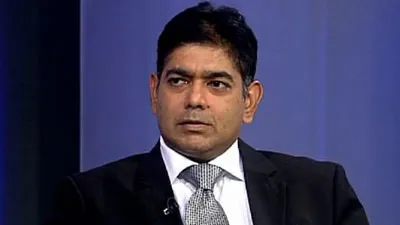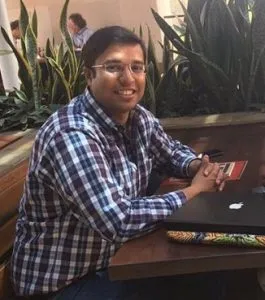Harvard graduate wants to make EFI Hub one-stop solution for entrepreneurs in Asia and Africa
Anu Shah’s Startup incubator EFI Hub aims to mentor and empower businesses driving social innovation in emerging markets of Africa and Asia.

In the absence of guidance, many startups fail to reach their full potential. This, despite the presence of many accelerators and mentors as they are not on one platform. This was the problem Anu Shah, 31, wanted to solve. Her quest led her to found EFI (Engage for Impact) Hub in 2017 while studying private equity and capital market investments at Harvard University.
EFI Hub is a startup incubator, mentoring and empowering businesses driving social innovation in emerging markets of Africa and Asia. Most of these are looking for mentors to scale their businesses.
“I believe success is not a solo endeavour. Through EFI Hub, I want to create a network of successful entrepreneurs, investors, government intermediaries and noted professionals and graduates from Oxford and Harvard universities to impart their knowledge, empower small and medium enterprises and create a (positive) impact on global communities at large,” Anu says.
EFI Hub is also aiming for global accessibility. “A startup based in Africa can leverage the expertise of talented Indian professionals and beat market expectations. Similarly, a startup in India can raise capital through investors in the US or Europe,” Anu says.
The inception
The EFI story started in 2005 when, after her under graduation course, Anu left her home with $40 for a call centre job in Mumbai for a meagre salary of $100 a month.
Later, she worked as a sales representative selling consumer products.
“I would walk in blazing heat of Mumbai for eight hours and cover 40 shops a day to achieve sales targets of $100 and a commission of a mere $10. But I always exceeded my sales target and quickly rose to become a brand manager in the same company,” she recollects.
After five years in Mumbai, Anu went to pursue an MBA at University of Leeds with a full scholarship. However, this came after a personal struggle as her parents were strictly against her pursuing further studies.
But Anu believes it was the best decision of her life.
“At Leeds, I finished top of the class and won several awards, including the sailing competition Regatta, for which I was featured in Asian Voice and on BBC. I won the Marks & Spencer’s Business Case Challenge and received the award from CEO Marc Bolland. I also won Pitch, a marketing competition conducted across the UK,” she says.
Anu went on to work in Asia, Europe, North America and Africa in M&A, strategy consulting and private equity with global firms like EY and AT Kearney.
But the turning point was a trip to East Africa in 2016.
A private equity professional then, Anu came across a craft brewery that employed only women. The CEO was a hexagenerian woman, who was a victim of domestic abuse, marital rape and once a teenage mother. She was committed to empowering other women in the community by creating livelihoods for them.
Anu says, “She had approached my firm to raise the seed capital. But her lack of experience, expertise and mentors on board made it a poor investment choice. Though I had to turn down the proposal professionally, I was impressed by her determination. I tapped my connections and found a Canadian brewery that extended support to train her employees. I arranged a crowd-funding initiative for the brewery that helped the business raise $110,000.”
Having experienced a lot of financial struggles and gender biases attached to being a woman, Anu - who was AVP at Acorn Capital in Boston USA - wanted to empower budding entrepreneurs in their quest to make a mark through EFI Hub.
Building the right team
Although Anu founded EFI Hub with Chaitanya Chaudhary, whom she met at Harvard University, he later dropped out to work on his tech startup idea. Anu is a sole founder now. In India, their mentors include Loginext Co-founder Dhruvil Sanghvi, Innov8 CEO Ritesh Malik, Lucedius Co-founder Saket Modi, JetSetgo Founder Kanika Tekriwal, and UrbanClap CEO Abhiraj Bhel.

(Photo courtesy: SABC)
In Africa, former South African politician Lavan Gopaul, who was Anu’s classmate at Harvard University, works as Legal and Policy Advisor. “We are presenting a white paper on Investment Policy Infrastructure to the South African government. We will leverage that to influence capital investment policy of other East African nations (like Rwanda, Kenya, Tanzania) and India,” Anu says.
Additionally, Utsav Mulay, from Tufts University USA, who was volunteering with an NGO that mentors entrepreneurs in Rwanda, has also joined EFI Hub as Director – Operations and Strategy (Africa).
Currently, EFI Hub has a team of three- Anu, Utsav and Lavan; all three have invested in the firm. They have also raised funding through Harvard Alumni Network, which has helped find connections in India and globally. Anu says industry professionals from Oxford, INSEAD, etc. have agreed to extend their support to mentor startups.
EFI Hub is now hiring a full-time strategy and operations team of three to focus on the India market.
Cambridge was chosen as the base as they wanted to leverage the expertise of Harvard faculties (and Cambridge is home to Harvard). EFI Hub has also partnered with the innovation and entrepreneurship labs of Harvard and MIT to identify the right businesses.
“We are exploring partnerships with governments in East Africa to facilitate and endorse our efforts to support a startup environment in their respective countries,” Anu adds.
Apart from media coverage, a presence on Facebook and LinkedIn has helped them reach out to startups. “It is through these efforts that we have currently narrowed our focus on two startups that we are mentoring,” says Anu, without disclosing the names of these startups as they are yet to sign MoU.
Choosing the right startups
The process behind choosing and supporting startups is elaborate. After due diligence, EFI Hub filters and on-boards 10 businesses annually. The team then helps them resolve issues in areas of strategy, marketing, operations, and capital raising.
Every month the team shares a progress report with advisors - a brief synopsis of the businesses taken on board, issues addressed and the progress the businesses have made. Thus, investors learn more about the businesses and pick ideas of their interest, to invest in. Similarly, entrepreneurs and professionals can pick businesses they can help, in the areas of their expertise and interest.
“Alternately, where deemed necessary, we will reach out voluntarily to our advisors and ask for their feedback on the matters of concern to these budding startups,” Anu adds.
Anu believes that a lot of founders do not understand how they can leverage the expertise or experience of firms to expand their business.
“A well-reputed VC firm can pull in global resources and connections that can streamline the business strategy, operations, help in getting contracts, increase revenues etc. If the founders are coachable and open to ideas, it works best for everyone,” she says.
The monetisation of EFI Hub is not a priority for Anu. EFI Hub is currently in discussions with the IFC, World Bank, Rwanda Development Board and other development finance institutes to get financial support and remain sustainable.
“Going further, I wish to leverage this experience and my experience as a PE professional to set up my own impact investment fund – EFI Capital that will incentivise and invest in businesses (or unicorns) identified by EFI Hub,” Anu says about her goals.
“My professors at Harvard have been guiding me in business strategy, geographical expansion, and business development. I am working closely with them to establish EFI Capital and raise funds for the same,” she adds. Big data analysis will be at the heart of the investment decisions at EFI Capital.
Focus on Africa and Asia
It is relatively easy for A-list entrepreneurs (typically starting from IIT, IIM or Harvard) to leverage alumni connections and build a network of mentors, investors and industry professionals. But this isn’t easy for entrepreneurs in Asia and Africa, even if they have great business or product ideas that can drive social innovation and change on a large scale in society.
The absence of a support system or inability to get access to capital leads to the untimely death of a lot of startups, which could have been disruptors otherwise.
EFI Hub wants to work closely with government officials and intermediary and influence the policy infrastructure, to help create a robust eco-system to ensure sustainability of small and medium enterprises. This is why they are currently targeting emerging and frontier markets of Asia (India) and Africa (Rwanda, Kenya and Tanzania).
“Rwanda will serve as a stepping stone before we penetrate the rest of Africa. In India, Delhi makes sense as we want to work with government intermediaries and influence the investment policy infrastructure,” Anu adds.

In Africa, they focus on businesses in health care, clean energy, technology and education sectors while in Asia and North America they focus on innovation in tech space followed by health care, energy and consumer segment.
EFI Hub is currently mentoring two start-ups in Rwanda – Mergims, Rwanda's first digital payment platform, and Digiskool, an online education tool provider with presence in Kenya and Rwanda.
“We recently connected Digiskool with the Ministry of Education and Ministry of ICT in Rwanda, which has helped them gain contracts for 100 schools in the region,” Anu says, adding that they are in conversations with tech giants and a leading Indian tech entrepreneur to invest in Mergims.
Focus on women entrepreneurs
According to the Sixth Economic Census by the National Sample Survey Organisation (NSSO), of the 58.5 million enterprises in India, only 14 percent - that is 8.05 million - are run by women, and most of them are micro enterprises which rarely achieve scale.
The main deterrent to women in entrepreneurship is the lack of confidence and skills, difficulty in accessing resources, networks and lack of mentors. To address this issue, EFI Hub is developing mentorship programmes targeting women entrepreneurs in the SME segment. It co-operates with government intermediaries in developing public policy, enabling easier access to capital for women entrepreneurs in India.
Anu adds, “The Startup India, Stand Up India scheme aims to facilitate bank loans of Rs 10 lakh-Rs 1 crore to at least one Scheduled Caste (SC) or Scheduled Tribe (ST) and one woman beneficiary per bank branch for setting up a greenfield enterprise in trading, services or manufacturing sector. But many women entrepreneurs, more so rural women entrepreneurs, are not able to access such schemes due to lack of awareness.”
Small steps, big joys
They say if you do what you love, no day is a tough day at work. Anu’s greatest joy is to see businesses succeeding because of endorsement by EFI Hub.
She says, “I remember when Davy Lee (CEO of Digiskool) had shared an email from Gustavo Brinier (who serves in Investment Committee of East Africa Investments) which stated that investors see the endorsement of EFI Hub in a positive light. I explained to Gustavo how EFI Hub will leverage the support of mentors; it helped them make a sound decision. We have secured $50,000 investment for Digiskool, through East Africa Investment recently.”
These are the kind of days Anu thrives on. And she hopes to have many more such days.







